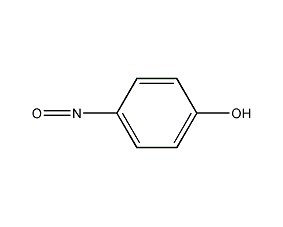p-nitrosophenol p-nitrosophenol

Structural formula
| Business number | 02QY |
|---|---|
| Molecular formula | C6H5NO2 |
| Molecular weight | 123.11 |
| label |
4-Nitrosophenol, 4-Nitrosophenol, 1,4-Benzoquinone Monoxime, Aromatic nitrogen-containing compounds and their derivatives |
Numbering system
CAS number:104-91-6
MDL number:MFCD00002329
EINECS number:203-251-6
RTECS number:SM4725000
BRN number:None
PubChem ID:None
Physical property data
1. Properties: light yellow needle-like crystals
2. Density (g/mL, 25℃): Undetermined
3. Relative vapor density (g/mL, Air=1): Undetermined
4. Melting point (ºC): 126-128
5. Boiling point (ºC, normal pressure): Undetermined
6. Boiling point (ºC, mmHg): Not determined
7. Refractive index: Not determined
8. Flash point (ºC): Not determined
9 . Specific rotation (º): Not determined
10. Autoignition point or ignition temperature (ºC): Not determined
11. Vapor pressure (mmHg, 20.2ºC): Not determined Determined
12. Saturated vapor pressure (kPa, ºC): Undetermined
13. Heat of combustion (KJ/mol): Undetermined
14. Critical Temperature (ºC): Undetermined
15. Critical pressure (KPa): Undetermined
16. Log value of oil-water (octanol/water) partition coefficient: Undetermined
p>
17. Explosion upper limit (%, V/V): Undetermined
18. Explosion lower limit (%, V/V): Undetermined
19. Dissolution Properties: Soluble in ethanol, ether, acetone, slightly soluble in water.
Toxicological data
1. Acute toxicity: Mouse peritoneal LDLo: 250mg/kg; Mouse gastrointestinal LDLo: 200mg/kg; 2. Mutagenicity: Mutant microorganism test: bacteria – Salmonella typhimurium, 50μg/plate; Mutant microorganism test: bacteria -Salmonella typhimurium, 666μg/plate; DNA repair test: Bacillus subtilis, 10mmol/L; Cell production analysis test: rat liver, 750μg/L;
Ecological data
None
Molecular structure data
1. Molar refractive index: 32.40
2. Molar volume (cm3/mol): 99.6
3. Isotonic specific volume (90.2K ): 262.2
4.Surface tension (dyne/cm): 48.0
5. Dielectric constant:
6. Dipole moment (10-24cm3 ):
7. Polarizability: 12.84
Compute chemical data
1. Reference value for hydrophobic parameter calculation (XlogP): None
2. Number of hydrogen bond donors: 1
3. Number of hydrogen bond acceptors: 3
4. Number of rotatable chemical bonds: 0
5. Number of tautomers: 4
6. Topological molecule polar surface area 49.7
7. Number of heavy atoms: 9
8. Surface charge: 0
9. Complexity: 97.2
10. Number of isotope atoms: 0
11. Determine the number of atomic stereocenters: 0
12. Uncertain number of atomic stereocenters: 0
13. Determine the number of chemical bond stereocenters: 0
14. Number of uncertain chemical bond stereocenters: 0
15. Number of covalent bond units: 1
Properties and stability
This product is toxic and may cause allergic reactions when in contact with skin. And has the effect of producing methemoglobin. Flammable and explosive.
Storage method
This product is a first-class flammable substance. The packaging should be sealed and stored in a cool, well-ventilated place. Store and transport according to dangerous goods regulations.
Synthesis method
It is obtained by the nitrosation reaction of phenol and sodium nitrite in the presence of sulfuric acid. Add 4.5-5t of water into the barrel and cool it to 0℃. Slowly add 595kg phenol at 0-6°C within 4 hours. Then add 595kg sodium nitrite and 530kg sulfuric acid. Stir for 1 hour and the temperature should not exceed 12°C. Add 12t of water and centrifuge to obtain p-nitrosophenol. Similar to the above process, a slightly lower reaction temperature can also be used for experimental preparation, and the reported yield is between 72% and 85%.
![]()
Purpose
Used as an intermediate for fine chemicals. It can also be used to produce rubber cross-linking agents, vulcanized blue BRN, vulcanized deep blue BBF, vulcanized reduced blue RNX, antipyretic and analgesic drug paracetamol, etc.